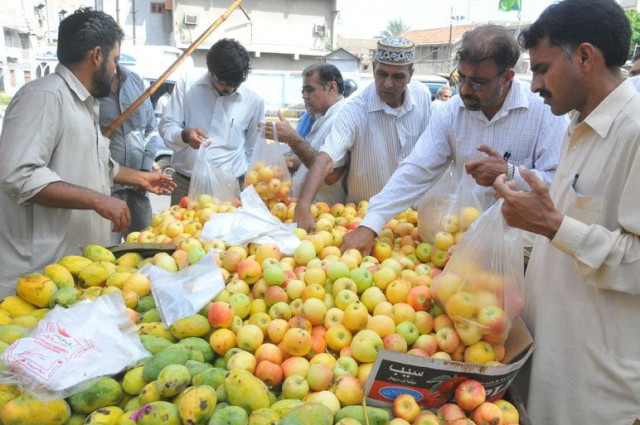Ramazan prices: Traders create artificial shortage of commodities
Prices raised to bag maximum profits

Profiteers have again found a way to jack up prices by creating artificial shortage of commodities in local wholesale markets to raise prices in Ramazan. PHOTO: MOHAMMAD AZEEM/EXPRESS
The government’s claim of regulating prices of essential commodities seems farcical as a random survey of different markets by The Express Tribune found that the prices of fruits, dates, cold drinks, gram flour, chickpeas, chilli peppers, coriander, tea, cooking oil and sugar have all shot up over the last few days.
The price of lemon has increased from Rs120 to Rs200 per kg. The price of a 10kg carton of Sindhari mangoes has risen to Rs1,400 from Rs800 to Rs1,000 range a few days earlier. Salvani peaches are being sold for Rs230 per kg. Local bananas, which retailed for Rs80 to Rs100, are priced between Rs100 and Rs150 per kg. Aseel dates are priced at Rs200 per kg, Dubai dates at Rs240, black dates at Rs150, Karbalaen dates at Rs200, and Iranian dates at Rs200 per kg.
Wholesalers in Raja Bazaar, a major supply point for the twin cities, have created artificial shortage of commodities, which are in high demand during Ramazan.
Wholesalers are demanding Rs3,500 for a 37 kg bag of gram flour, which was available for Rs2,400 to Rs2,600 just a couple of days back. Similarly, sherbets are selling for Rs1,800 for 6 pack crate which was being sold at Rs1,500 a few days back. Chilli peppers used in pakoras and samosas were retailing for Rs200 per kg prior to Ramazan, but are now going for Rs250 per kg at wholesale markets. Moreover, a 50 kg bag of refined sugar is selling for Rs6,400, against a price of Rs6,100 last week.
Usually the prices of daily use commodities are increased by the wholesalers in the first 10 days of every month. “This year Ramazan falls more than 10 days before the start of new month, so the current price hike is likely to continue as the salaried class will start shopping after getting paid,” said trader Adil Khan.
Published in The Express Tribune, June 20th, 2015.



















COMMENTS
Comments are moderated and generally will be posted if they are on-topic and not abusive.
For more information, please see our Comments FAQ